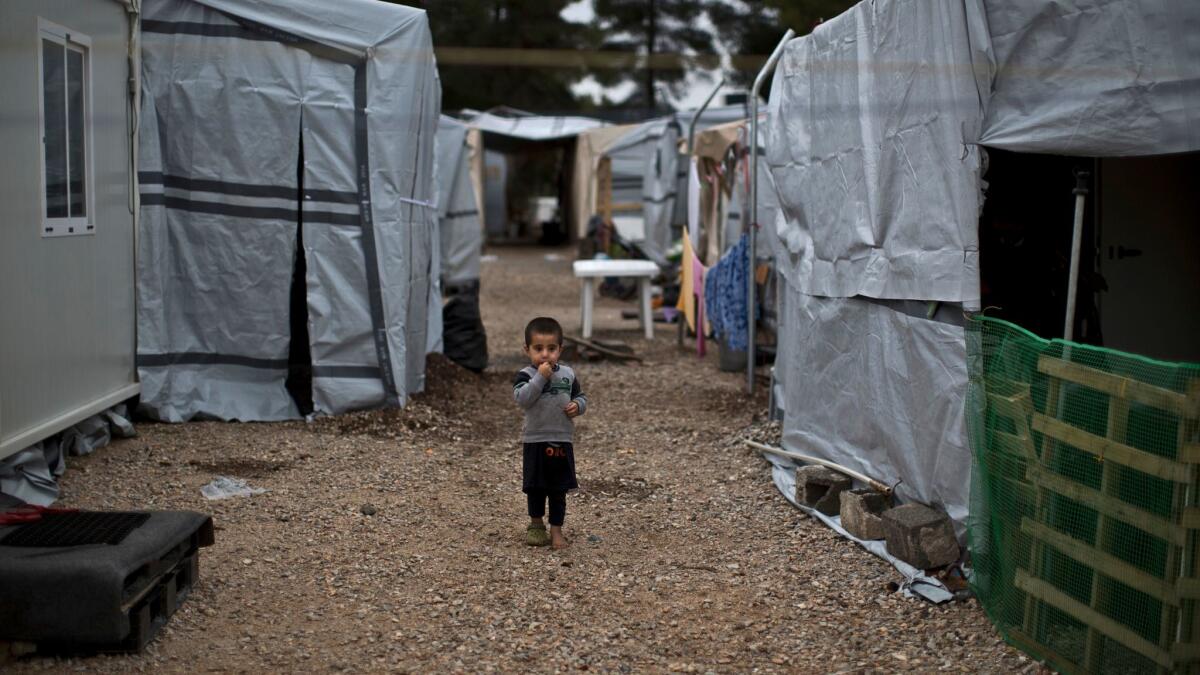Op-Ed: 2016 is not done with us

- Share via
It’s time to bid good riddance to everything horrible that has happened in the past year.
From headlines in the Washington Post and BuzzFeed to posts sprinkled across social media sites to casual conversations at holiday parties, we’re collectively writing off the past 12 months as truly terrible in the hopes that next year will be an improvement. “It wasn’t a bad year for me personally,” a friend said to me this week, “but, wow, was it an awful year for the world.”
This line of thinking might seem pessimistic, the result of a depressive tendency to highlight only the worst aspects of the past 12 months. Some good things happened too, even if none immediately springs to mind. But “worst year ever” comments are actually unnaturally optimistic. To declare you’re “so over” 2016 is to assume that everything that made this year difficult will come to a hard stop when the clock strikes midnight on Dec. 31. To declare 2016 the worst year ever carries the audacious implication that we can leave behind the negative things that happened and start fresh.
The things that made the year so difficult — war, economic inequality, broken democracies, entrenched racism and sexism — are not going away.
Complaints about 2016 are well-founded. The United States elected a uniquely unqualified president who embraces misogynistic and white-nationalist rhetoric — and saw a subsequent spike in hate crimes. The public mourned the deaths of beloved figures including Prince, Muhammad Ali and David Bowie. According to a BBC survey of obituaries, twice as many notable people died in 2016 as did in 2015.
Across the Atlantic, voters in the United Kingdom decided to leave the European Union, even as thousands of Syrian refugees shivered in makeshift camps from Greece to Germany. Venezuela’s economy collapsed, and its democracy may follow suit. The Philippine president bragged about gunning down citizens in the streets. And there was a parade of natural disasters (wildfires in California, landslides in Indonesia) corporate scandals (Wells Fargo) and communicable diseases (Zika).
Social media compounded the effect of each piece of bad news. “The awful folkways of social media — which encourage us to call out bad things in dramatic fashion and then pretend that we’ve been helpful — have led to something of an annual conclusion,” Jia Tolentino wrote in the New Yorker. “Google searches for ‘worst year ever’ spike each December.”
But 2016 isn’t done with us.
The things that made the year so difficult — war, economic inequality, broken democracies, entrenched racism and sexism — are not going away. Important artists and cultural figures are going to die in 2017. Openly racist politicians with autocratic tendencies will be elected in 2017. Economies will collapse in 2017. Unarmed black people will be killed by police in 2017. Civilians will die in senseless wars in 2017, and many others will become refugees.
This is only cause for despair if we’re willing to sit idly by. Most of us have the ability to work against the forces that made this year so terrible (with the exception of human mortality, of course). We can support electoral reform efforts and opposition candidates. We can turn up in the streets to demand that our leaders protect Medicare and respect civil rights and hold police accountable. We can support organizations working to counteract the negative effects of civil wars and forced migration.
Action will require a shift in perspective. As consumers of news and social media, it’s easy to feel we are passively watching an endless number of heart-rending and blood-boiling stories unfold. The “worst year ever” frame encourages the view that we are powerless to change the headlines we read. But if we can start thinking of ourselves as agents rather than mere observers — as people who have an important role to play in changing the circumstances that currently bring us despair — the parade of negative news becomes a call to action. These compounding events are, in fact, a to-do list for the coming months.
“The past is never dead,” as the oft-misquoted William Faulkner line goes. “It isn’t even past.” This is acutely true in the waning days of 2016. While it might be an exhausting truth to recall on New Year’s Eve, when we’d rather sip bubbly wine and toast to a fresh start, next year won’t be an improvement simply because it’s a new calendar year. If we want 2017 to be better, we have to work to make it so.
Ann Friedman is a contributing writer to Opinion. She lives in Los Angeles.
Follow the Opinion section on Twitter @latimesopinion and Facebook
MORE FROM OPINION
When cancer is trying to kill you, another New Year’s Eve is a humbling bonus
What needs to happen next for homeless people in L.A. County
The media got a lot wrong this year, but the criticism has been over the top
More to Read
A cure for the common opinion
Get thought-provoking perspectives with our weekly newsletter.
You may occasionally receive promotional content from the Los Angeles Times.










